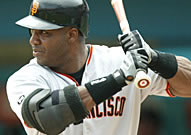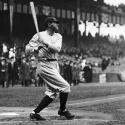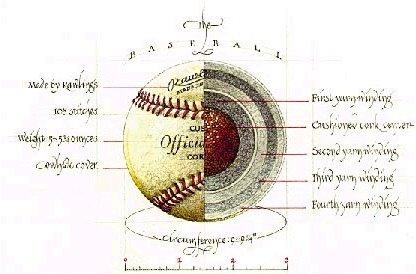
Over the weekend,
Barry Bonds drew even with
Babe Ruth on the lifetime home run list. Bonds hit number 714 in Oakland off
Athletics pitcher
Brad Halsey, ending a two-week long vigil.
Though Bonds and Ruth are the only
Major League players--along with leader
Henry Aaron at 755--to have hit 700 or more dingers, the two occupy very different places in the hearts of fans.
(All three, however, rank far behind
Sadaharu Oh, the
Japanese Professional League career leader with 868 home runs.) Ruth is a beloved icon, seen as an affable man who would rush to the bedside of a sick child at a moment's notice. Bonds is reviled by many, seen as a selfish man who would eat his own young.
Certainly, neither image represents the real human being. Why, though, have these men attracted such different mythologies when both gained near godlike status for doing the exact same thing, namely, hitting baseballs out of the park?
One reason is that Ruth is dead, and Bonds is not. It is easier to love a dead man than one who beats your favorite team on a regular basis. The Babe's legend could only reach its zenith after his death. When Bonds has been gone for a generation or two, he will also likely be remembered much more fondly. Also, during Ruth's time, the media had a much different type of relationship with professional athletes. Today's media-player relations are much more adversarial.
A second reason is racism. There are Americans who chafe at the idea of a strong, confident black man equaling the feat of a white hero from a Golden Age of Major League baseball (an age during which black players were excluded). Even if Bonds were a saint, some would begrudge his success. Aaron, who seems to have been much more likeable--though, like Bonds, reserved--endured an intense amount of violent racism, especially as he approached Ruth's home run mark.
Bonds and Ruth also seem to lie at opposite ends of the personality spectrum. Our contemporary image of Ruth is that he was a people person. He was the life of the party. His digestive feats and womanizing are as legendary as his hitting records. He could hit home runs at will for sick children and call his shots.
Bonds, though, gives off a different vibe. He is quiet, does not warm to the media circus that surrounds him, and does not seem to care whether you are his friend or his enemy. He is intense and focused on his job. While Ruth tanked up on hot dogs and beer, Bonds has a personal trainer to keep him in line.
Since our personal psychologies are often rooted in our childhood, I began to think about what made these two ballplayers such different people. A possible answer developed pretty quickly. It is easy to imagine that Ruth was always on the search for love and acceptance. He grew up in a Baltimore orphanage, and may have craved the kind of belonging that many families provide.

When Ruth excelled at baseball, first as a pitcher for the
Boston Red Sox, and then later as the primary bomber for the
New York Yankees, he received the kind of affection and attention that would have been missing in an orphanage. His partying and multiple affairs with women can also be seen as symptoms of a near desperate search for affirmation. He may have come off as a clown, but he was loved.
Bonds, on the other hand, grew up the son of a Major League star. His father,
Bobby Bonds, played for eight teams from 1968 to 1981. The elder Bonds also combined power and speed. He was an all-star three times, and won three Gold Gloves.
Though one possible reaction to growing up as the son of a star is fear of failure, fear of measuring up, another possible reaction is supreme confidence. Barry saw that his father was loved (and sometimes treated poorly) by fans, and may have seen that celebrity as a natural part of life. He grew up with
Willie Mays--perhaps the best ballplayer in history--as his godfather. Bonds may have received the affirmation that Ruth never found as a youngster. Would Bonds see his role in life as privileged, or would he simply learn a type of supreme confidence most of us never know?
Barry Bonds and Babe Ruth are indeed the
Odd Couple of baseball. Bonds is the fastidious Felix, and Ruth is the slovenly Oscar. If they had played together, they would probably have ended up as roommates and become lifelong friends, Bonds in left field, Ruth in right. The Babe would have become godfather to Bond's children. Bonds would have cleaned up Ruth's hot dog wrappers from the dugout in an obsessive frenzy, and Ruth would have put eyeblack around the headband of Barry's hat. Yet for the moment, they only share one thing: the number 714.
And what about my personal opinion of Bonds, you may ask? As a ballplayer, I don't like him. The Giants aren't my team, and so he's the enemy. I do not know him personally, but do not like what I have seen. He does appear to be somewhat selfish and surly. Yet, it isn't my place to judge him (though that's what I just did!). Regardless of what type of person he is, it is a terrible thing to wish him harm or to behave abusively toward him.
Even if it is proven that Bonds used steroids, I admit that he has exceptional talent. The man is a professional and works hard to improve and perform at a high level. I admire him for that.
But come on, Barry, give us a smile now and again. It would make life a lot easier for you.





